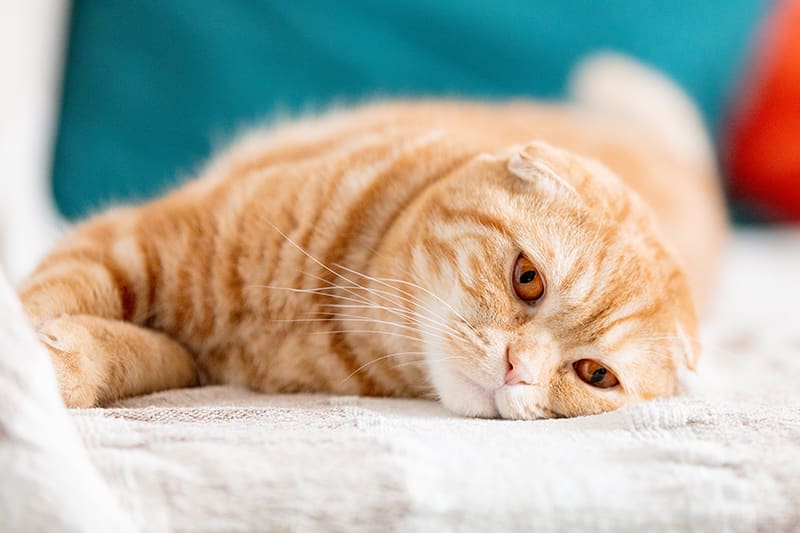Pet Care
Hepatitis in Cats – Symptoms to Watch For
The Function of Your Cat’s Liver
Your kitty’s liver plays a fundamental role in their body’s ability to convert food into nutrients. Your cat’s liver also works hard to filter impurities, poisons and drugs from the blood, synthesize proteins and enzymes, and produce bile which is necessary to carry waste products out of the liver.
Causes of Hepatitis in Cats
Hepatitis is a liver disorder seen in cats that may be caused by parasitic diseases, viral and bacterial infections, or metabolic conditions (such as hyperthyroidism). If your feline friend develops hepatitis their liver becomes inflamed and its function becomes impaired.
Two types of hepatitis commonly seen in cats are Cholangiohepatitis and Lymphocytic Portal Hepatitis, and each has its own list of symptoms associated with it.
Cholangiohepatitis
Cholangiohepatitis in cats is characterized by the bile ducts and liver becoming inflamed, potentially due to a fungal or bacterial infection. In some cases, cats with this condition also experience digestive disorders such as pancreatitis or inflammatory bowel disease.
This form of hepatitis is characterized by the restricted flow of bile due to inflammation and swelling, possibly leading to caustic bile fluids damaging the liver and biliary ducts. This form of hepatitis may be caused by an immune-mediated infection or diseases such as liver flukes, toxoplasmosis, feline leukemia or feline infectious peritonitis.
Common Signs of Cholangiohepatitis in Cats
- Vomiting
- High fever
- Jaundice (yellowing in the eye)
- Loss of appetite
Lymphocytic Portal Hepatitis
The cause of Lymphocytic Portal Hepatitis in cats is still something of a mystery, although it is largely believed that this inflammatory liver disease might be related to thyroid disease or immune system dysfunction. Lymphocytic Portal Hepatitis is more often seen in older cats who have a history of hyperthyroidism.
Common Signs of Lymphocytic Portal Hepatitis in Cats
- Lethargy
- Unexplained weight loss
- Enlarged liver
- Fever
- Diarrhea
- Decreased appetite
Diagnosing Cats With Hepatitis
When you visit the vet they will request a full medical history for your cat and ask a series of questions regarding your kitty’s health prior to symptoms becoming evident.
After performing a thorough examination, if your vet suspects that your cat may be suffering from hepatitis, they could recommend diagnostic testing to confirm the diagnosis. Tests often used to diagnose hepatitis in cats include a CBC complete blood count, blood chemical profile, urinalysis and electrolyte panel.
X-rays and/or ultrasound imaging may also be recommended to allow the vet to examine the liver, and a liver biopsy may be performed to provide a definitive diagnosis.
Hepatitis in Cats Treatment
The treatment prescribed for your cat’s hepatitis will depend on how severe their condition is. For some cats with hepatitis hospitalization and fluid therapy will be required, along with a number of supplements including dextrose, vitamin B and potassium.
During your cat’s recovery, you will need to make an extra effort to keep your kitty warm and comfortable and restrict their activity level.
Fluid buildup in your kitty’s abdomen may be treated with medications, which can also be prescribed to treat an abdominal infection, decrease brain swelling, decrease ammonia production and absorption, and control other serious symptoms such as seizures. In some cases, an enema will be performed in order to empty the colon.
To reduce the burden on your cat’s liver, switching your kitty to a prescription food and feeding several small meals a day may be recommended. This therapeutic diet will be low sodium and supplemented with thiamine and other vitamins.
Cats that are rapidly losing weight due to lack of appetite may require an intravenous feeding tube to ensure they do not continue to lose muscle.
Managing Your Cat’s Hepatitis Symptoms
Depending on the underlying cause of your cat’s hepatitis your veterinarian may recommend follow-up appointments for ongoing treatments, to check your cat’s overall health, and to watch for worsening symptoms.
You will need to monitor your cat’s health at home, keeping a close eye on your kitty’s symptoms. It is essential to contact your vet immediately if your cat loses weight, their symptoms worsen or their bodily functions begin to deteriorate.
Note: The advice provided in this post is intended for informational purposes and does not constitute medical advice regarding pets. For an accurate diagnosis of your pet’s condition, please make an appointment with your vet.
Has your cat been displaying concerning symptoms? Our Clemmons vets can help you to get your cat back to a healthier weight. Contact Animal Hospital of Clemmons today to book an examination for your feline friend.
Looking for a vet in
Clemmons?
We’re always accepting new patients, so contact our veterinary hospital today to book your pet’s first appointment.
Related Articles View All
How to Tell if Your Cat Has a Broken Leg
Regardless of whether your cat is a curious outdoor explorer or a chilled-out homebody, accidents can happen. Today, our Clemmons vets share signs that may indicate that your cat has a broken leg, and what you should do.
Cat Coughing, Sneezing & Wheezing
Is your cat coughing, sneezing and wheezing instead of contentedly purring? Cat coughs are a sign that something is irritating your feline friend’s lungs, airway or throat. Today, our Clemmons vets share some common causes of cat coughs and what to do.
Signs of Pain in Cats & How to Help
To provide your cat with all the care they need to live a long and healthy life, it’s important to be able to spot the signs of pain early and know what to do. Below, our Clemmons vets offer some advice on how to tell if your cat is in pain, and what you can do to help.
My Cat is Sleeping Constantly: Is this Cause for Worry?
Cats, without a doubt, enjoy sleeping. Concerned cat owners frequently ask our Clemmons veterinarians if they should be concerned that their cat sleeps so much. When does a cat nap signal the possibility of a medical emergency?
A Pet Parent’s Guide to Cat Dental Care
Cats are as likely as people to suffer from painful dental health issues caused by injury or poor oral hygiene. Unfortunately, many cat owners don’t know what dental care for cats involves or how to care for their feline friend’s oral health. In today’s blog, our Clemmons vets explain how to clean your cat’s teeth and care for their oral health.







